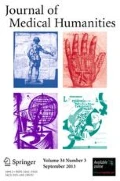Abstract
Media appeals encouraging people to sign organ donor cards suggest that donating one's own organs after death or donating the organs of a deceased family member is an act of charity, i.e., something which it would be meritorious for people to do but not wrong to avoid. This paper argues to the contrary that posthumous organ donation is a moral duty, a duty of the type that rests at the base of recently enacted state “Good Samaritan” laws which require a witness to an emergency situation to render aid to the victim(s) when this can be done at minimal cost/risk to the potential rescuer.
Similar content being viewed by others
Reference notes
Diane L. Manninen & Roger Evans, “Public Attitudes and Behavior Regarding Organ Donation,”JAMA 253 (June 7, 1985): 3111–3115. The authors report that their study shows that 94% of the population had heard about organ transplants.
Tom Beauchamp & James Childress,Principles of Biomedical Ethics, 2d Edn., (New York: Oxford University Press, 1983).
Ibid., p. 108.
Ibid., p. 148.
Ibid., p. 108.
Vermont Statutes Annotated, Title 12, Sec. 519, Supp. 1971.
Minnesota Statutes Annotated, Vol. 38, Sec. 604.05 (West Pocket Part, 1985).
Osterlind v. Hill 263 Mass. 73, 160 N.E. 301 (1928).
Buch v. Amory Mfg. Co., 69 N.H. 257, 44 A. 809 (1897).
Ibid.
Union Pacific Ry. v. Cappier, 66 Kan. 649, 72 P. 281 (1903);Yania v. Bigan 397 Pa. 316, 155 A.2d 343 (1959).
See William M. Prosser,Handbook of the Law of Torts, 4th Edn. (St. Paul, Minn: West Publishing Co., 1971), pp. 338–343.
Ernest J. Weinrib, “The Case for a Duty to Rescue,”Yale Law Journal 90 (December, 1980): 280–281.
Ibid., p. 262: A.D. Woozley, “A Duty to Rescue: Some Thoughts On Criminal Liability,”Virginia Law Review 69 (October, 1983): 1290–1291.
Weinrib, op. cit., “ p. 262; Robert Lipkin, “Beyond Good Samaritans and Moral Monsters: An Individualistic Justification of the General Legal Duty to Rescue,“U.C.L.A. Law Review 31 (October, 1983): 271
Lipkin, op. cit., “ pp. 272–275
Richard Epstein, “A Theory of Strict Liability,”Journal of Legal Studies (1973): 151–221.
Lipkin, op. cit., pp. 268–269.
Epstein, op. cit., p. 199.
Woozley, “A Duty To Rescue...” p. 1299.
Some exceptions merit comment. A “status 9” heart patient is one who is likely to die in 48 hours without a transplant (Doug Lefton, “How Jarvik-7 Patient Got Real Heart,”American Medical News (September 20, 1985):1,45). At any one time 6–8 heart patients are expected to die in 48 hours or are rejecting an already implanted heart (Doug Lefton, “New Worry About Donor Heart Supply,”American Medical News (September 13, 1985):2, 52).
Richard L. Fern, “Human Uniqueness As A Guide to Resolving Conflicts Between Animal and Human Interest,”Ethics & Animals 2 (March, 1981):7–21.
S.R. Sophieet al, “Intensive Care Nurses Perceptions of Cadaver Organ Procurement,”Heart & Lung 12 (May, 1983): 266.
William F. May, “Religious Justifications for Donating Body Parts,”Hastings Center Report (February, 1985): 38–42, at 38.
Ibid.
Clarence Strub and L.G. Frederick,The Principles and Practice of Embalming 2d Edn. (Dallas, Texas: L. Frederick, 1959), pp. 334–351.
Ibid..
“Guidelines for the Determination of Death,” Report of the Medical Consultants On the Diagnosis of Death to the President's Commission for the Study of the Ethical Problems in Medicine and Biomedical and Behavioral Research,JAMA 246 (November 13, 1981): 2184–2186.
Frans Winkel, “Public Communication On Donorcards: A Comparison of Persuasive Styles,”Social Science & Medicine 19 (1984): 957–963.
“Oregon Panel Explores Medical, Ethical Questions,”American Medical News (October 26, 1984): 37–38.
Wally Tokarz, “Organ Procurement Key To Transplant Gains,”American Medical News (August 2, 1985): 3,15,16.
Rights and permissions
About this article
Cite this article
Peters, D.A. Rationales for organ donation: Charity or duty?. J Med Hum 7, 106–121 (1986). https://doi.org/10.1007/BF01117902
Issue Date:
DOI: https://doi.org/10.1007/BF01117902



